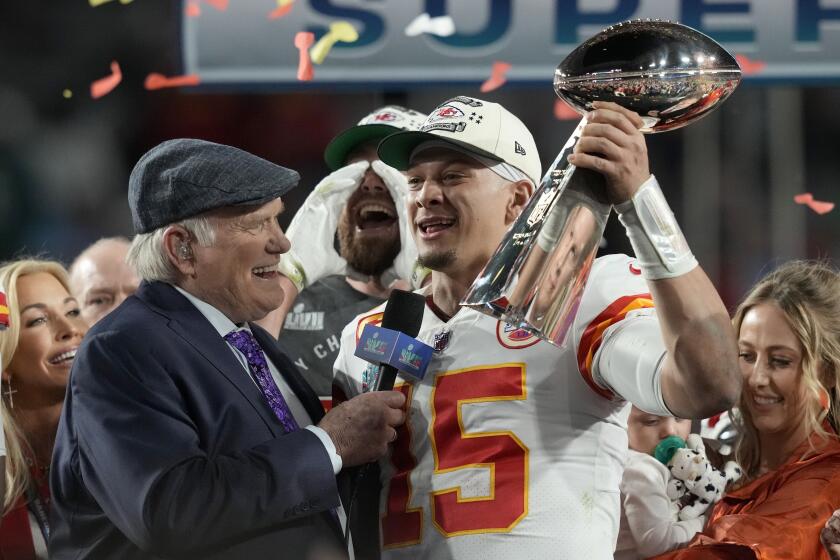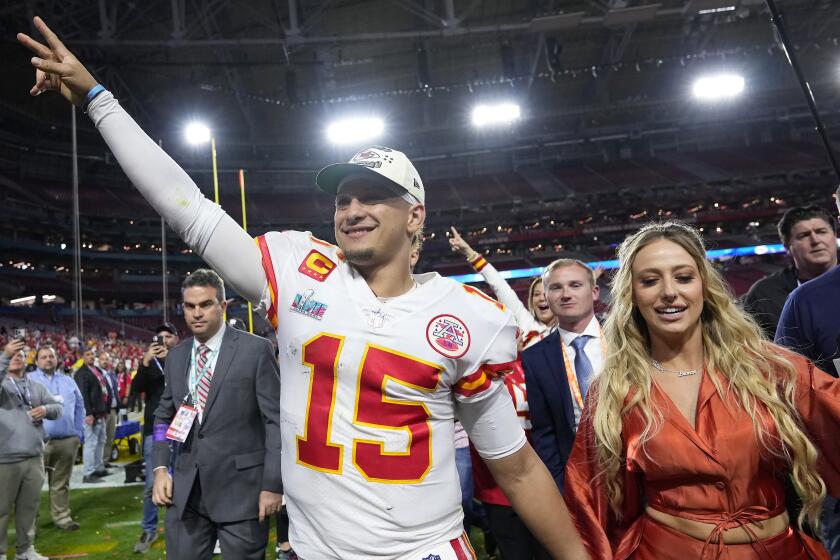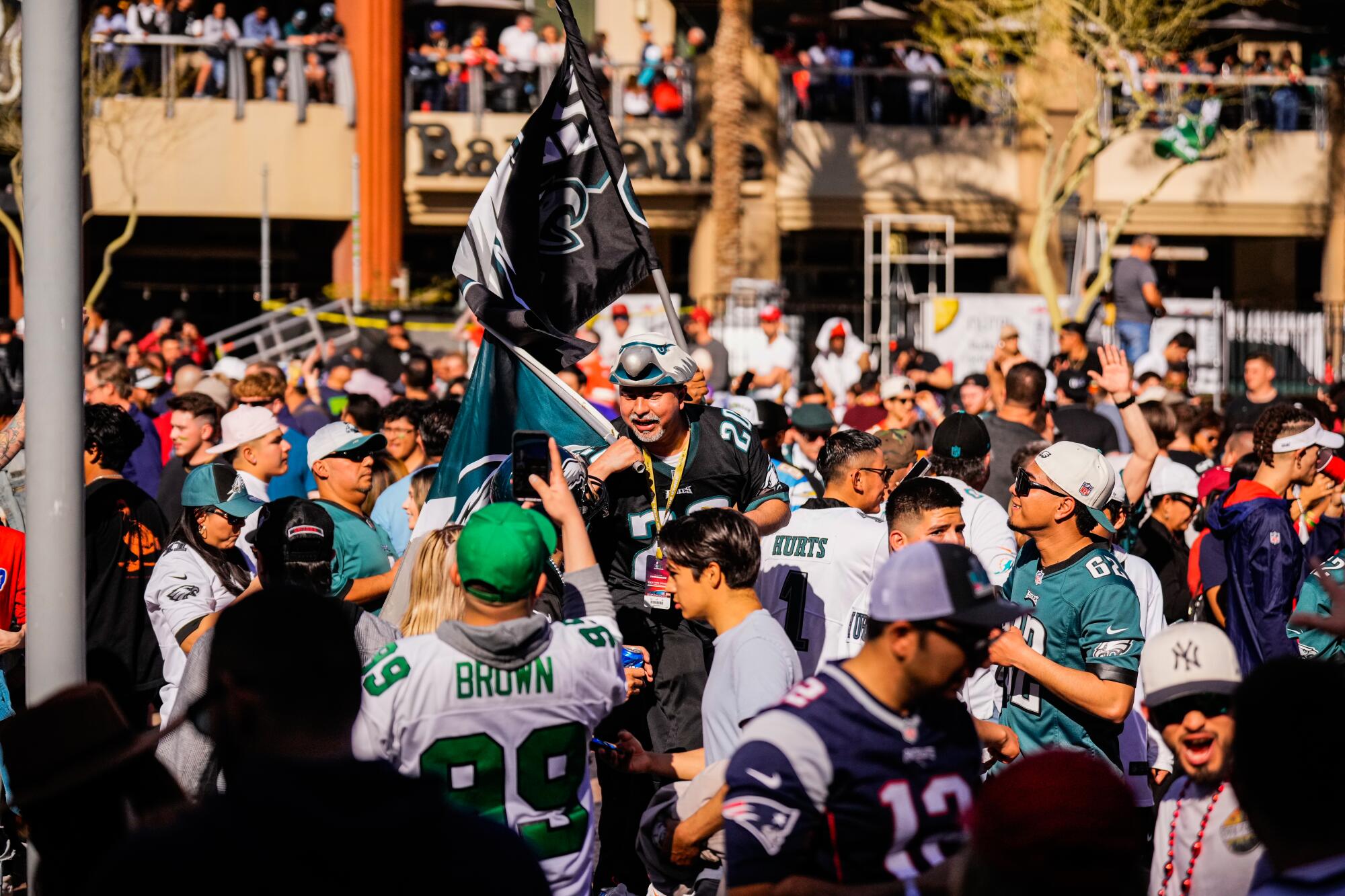
- Share via
GLENDALE, Ariz. — Rising with effort from the back of a glistening keg, shoulder pads blessed on his back and a midnight green mohawk lifting from the apex of his silver-brushed skull, Jamie Pagliei tells me a war story filled with delusion.
“I’ve been painting up for 25 years,” the 50-year-old declaims, his voice building into a steady rumble. “It’s been hard work; no one’s ever done this before. I’m trying to make a living painting my face while not being on the Ringling Bros.”
He started to get recognized at a New Orleans Saints game around 2018.
“I had a video go viral and it blew up,” he says, adjusting the fine follicles of his hair. “Since then, I’ve done commercials and a production company said I had great energy. I was like ‘The Philly Sports Guy,’ they said, and I should see if that name was available.”
From there, a star was born. Jamie grew out the ‘hawk, gathered his finest jerseys and high school equipment, and adopted his persona as his full-time line of work. The face paint ain’t an act. That jawn is his salary.
“Being the Philly Sports Guy isn’t very lucrative,” Jamie says.
I figured, my man.
He was no different than so many men from the place where I was made. He was as full of fantasy as he was inspiration. Misery will do that to a man. For six generations, Philadelphia, at least when it came to football, was home to a contentious sack of pugilists. The boys who threw batteries at Santa. You know the tune. Then Ol’ Saint Nick delivered us from evil and shocked the world with a Super Bowl win in 2018. We’ve heard plenty about that one too. Denizens drove ATVs up museum steps, climbed cars and drank the city dry in a fortnight. Everyone had had enough of us, and yet wanted more all the same. Stuck between Napoleon syndrome and a newfound status of champions changed, inherently, what it meant to be Philadelphian.
“This team represents what embodies Philadelphia: hard work, dedication, everything. ... We are aggressively passionate, and that’s why we get a bad rap.”
— Fan Jamie Pagliei, who is known as ‘The Philly Sports Guy’
But agony still drives Jamie. It drove all of us mad; my grandfather, who bore into me the belief when I was a boy, and all of the elders around the city who taught us what it meant to Bleed Green. Heartbreak littered our legacy. Rooting for the Eagles wasn’t a choice for Jamie. It was his birthright. One championship wasn’t enough. Winning made his greed insatiable. He wanted more, because all of us did.
“And now,” he tells me, “we’re in the promised land.”
What do you think would happen if the Eagles won another Super Bowl, I asked him.
“When we do,” he corrects me. “We’ll deserve it. This team represents what embodies Philadelphia: hard work, dedication, everything. We all work our balls off and care about this team. We are aggressively passionate, and that’s why we get a bad rap.”
That all?
He sat there and thought about his choice of words. He nods to himself.
“We know what we’re talking about,” he assures me. “And we won’t take any smack from anybody!”
The desert winds are kickin’ my ass, yo. Gales from Blythe all the way to Buckeye almost blew my car straight off the road. Ain’t too much in the way of scenery out here, even though every Tom and Jerry in West L.A. swore that a ride down I-10 would change my life like a Scientology conversion.
For a man who’s never lived out West, done meth or casually traveled through dust storms, let me just say that advice was bullshit. Sure, I stopped in Joshua Tree, but that doesn’t make these snowcapped mountains, long open plains and broke-down palm trees any more appealing. And before you tell me I’m wilin’, you ask the next city boy you know when he’s seen a tumbleweed blow across the interstate before breakfast. I ain’t never heard one of Johnny Cash’s tunes, but I assume Laredo has to be somewhere nearby.
Historically, Philly fans moved in packs. Some like parasites. Players have told me over the years how much they hated coming into town because of the fans. Coaches spent the postseason agonizing over what to tell their families if they came to see the game. It was understandable: These people were rabid. I don’t know a brave man alive willing to send their mother or wife tickets to swim in a pool of piranhas.
And no doubt, all over Phoenix it was true. Fans were yelling everywhere I went. They’d taken over buggies and carts near Arizona State in Tempe. “It’s a Philly Thing” paraphernalia was strewn across Lime scooters in downtown Phoenix. Philadelphians were outnumbering the red of Kansas City almost 4 to 1.
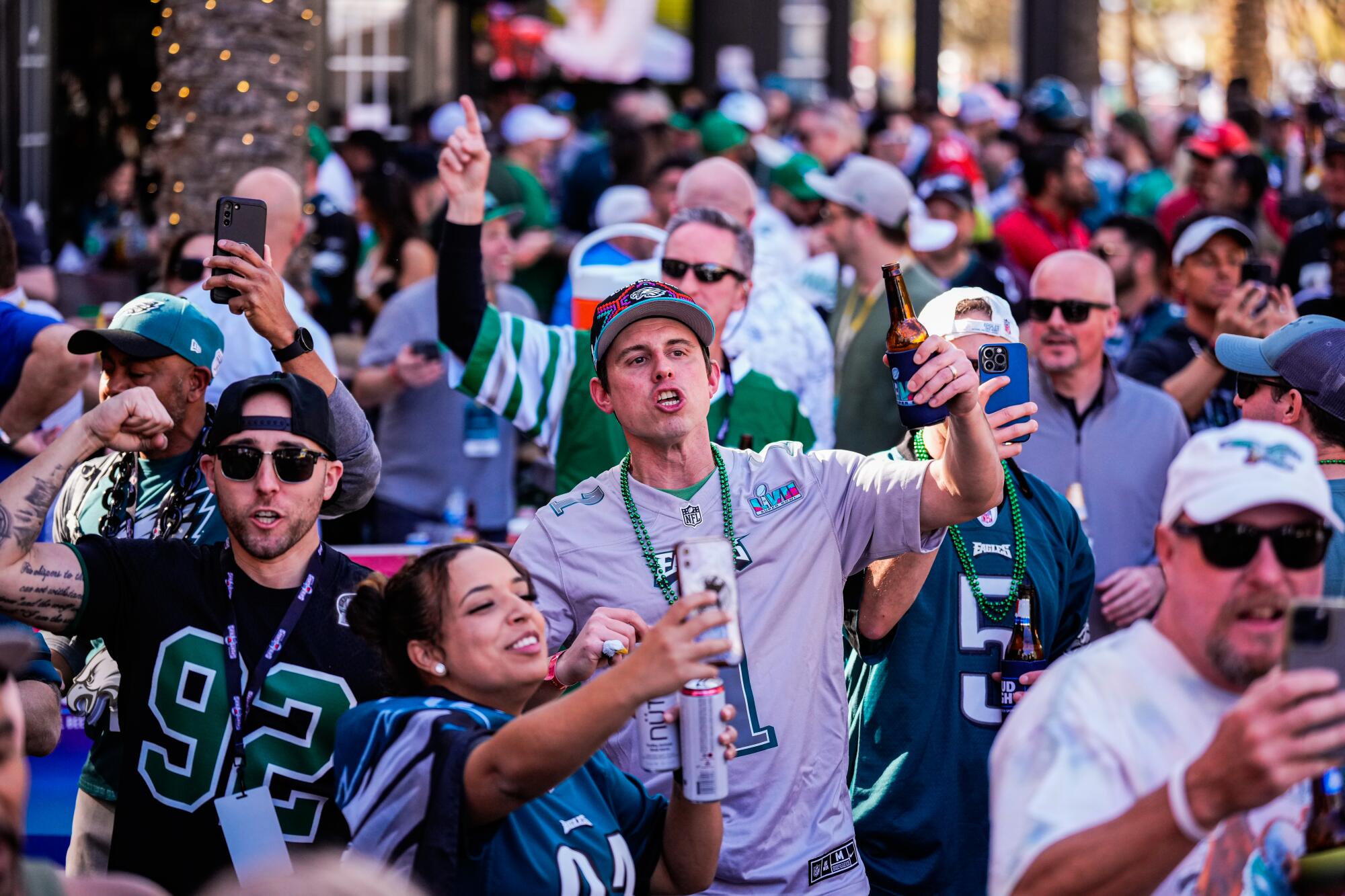
Up and down the Salt River Valley were Eagles fans tattooed with a beam. For an entire week, those jackals painted the desert green.
At Philly’s, an aptly named tavern in Scottsdale, a horde of fans stole the bar for the afternoon. More than 200 people munching cheesesteaks, gnawing wings and talkin’ Birds with an open bar. What a dangerous sight. Grown men in there had their beards dyed emerald. Women wore makeshift wings that stretched around their elbows and flapped around the patio between sips of whiskey. Somebody’s grandma was in the cut, cussin’, with a hat that contained a continuous, flying Eagle. Then, look at that goof in the corner, he’s in a white wig pretending to look like Doug Pederson. Even the white boys who loved on that bum Carson Wentz came correct: They crossed off the No. 11 and left a No. 1 for Jalen Hurts, the Black gunslinger who led them to this Super Bowl. And don’t get ‘em rowdy out here or they’ll start swinging. Just say “Gwhoooh Bwiirds” or you’ll be speaking sacrilege.
“Stuff like this does our heart proud,” Jason Avant, an Eagles receiver from 2006 to 2013, tells me. Avant was one of the grinders on the team during the last of the Andy Reid era. He was master, well trained in the art of the catch and made fearless plays over the middle of the field, in the fire of battle. Something fans, like those out there at Philly’s, always loved him for.
“The winning culture and legacy we established made it possible for this team,” he said. “We can’t take credit for it, it’s always about Philadelphia for us. It takes a lot of years of losing before the winning.”
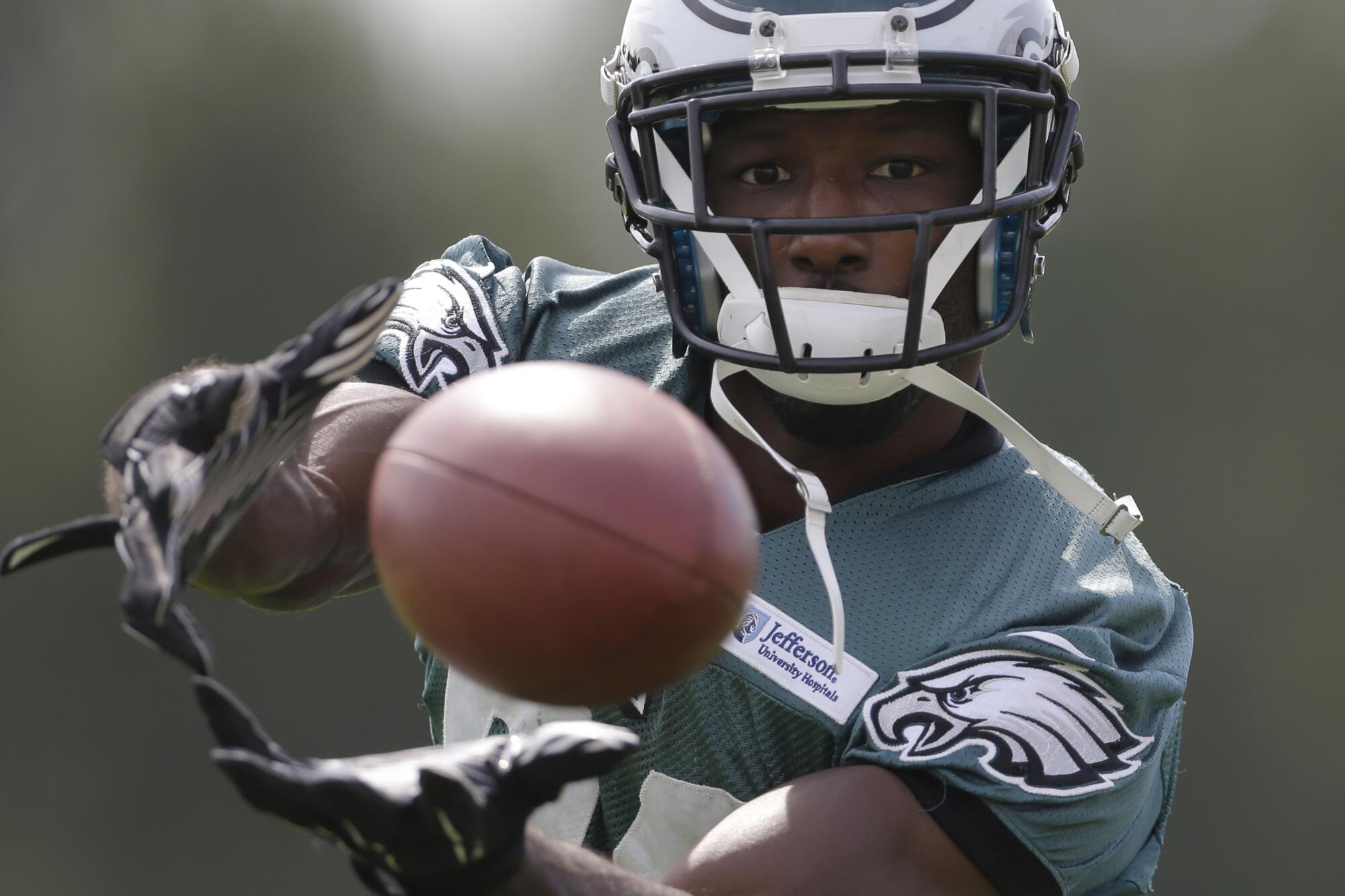
After years of brutal losses, vets see a sign of change now. Philly was no longer the little brother of the NFL. They were on the cusp of true greatness.
“The fans are used to a gold standard now,” Barrett Brooks, a former tackle on the team in the ’90s, tells me. He says it’s fueled by what they saw in the stands as players. “I’ve had batteries thrown at me for not playing well,” he says. “And I’ve had fans go above and beyond for me and save my life.”
People were partying long into the afternoon, shoulder to shoulder with the men who cried as they did every time the city flew short. But, there’s belief in this town. Chatter of a dynasty in Philly. Maybe it’s all this desert air, but I’ve never heard that type of talk before back home.
Friends in town said all week that something was different this time, compared to 2018 or even 2004. It was a consistent line I’d heard from the Philly faithful. These jokers felt like they belonged. They were the ones who killed Tom Brady in his prime, the gang of underdogs who proved the football world was finally big enough for them too.
Sure, I said. I thought it was merely Super Bowl hysteria.
But belief can be a mighty thing. It can change fortunes, move mountains, propel or destroy careers overnight. When Donovan McNabb blew the Bowl for us in ’04, the first rumor that came out was that he was drunk the night before, so hung up on nerves that he puked his guts out in the huddle before the first play. We killed him forever for that. Called him a punk until he walked out of town. He was never the same after that game. I’m not suggesting empathy — he should’ve found Terrell Owens, on the post route, for a touchdown at the end of the … that’s besides the point.
Belief in the hands of fans with nothing to lose, who knew what the outcome might be.
And on that patio, at Philly’s in Phoenix, belief was out there. Fans flew middle fingers into the cloudless sky, a regional salute to the haters in tow. Philly would win the big game. Or Philly would be ready to fight in the parking lot.
Daybreak barely pierced through my curtains that Sunday before I started hearing Eagles fans. Running down the dark, carpeted hallways of my hotel; honking horns going down the highway. I got up and dragged myself to breakfast, only to find fans mocking other fans because their teams weren’t in the big game. I almost felt sorry for the poor couple. Philly fans were swarming like an infestation, a plague that wouldn’t stop destroying everything in its way through the desert.
In some ways after the 2018 championship, the tale of the plucky underdog ended for Philadelphia. How could we still be cute ragamuffins, or sensationalized versions of Eagles fans past, if after NFC championship blowouts we run down Broad Street and climb light poles? That was who we were when we won, now it was who were stuck as while we tried to make magic happen twice.
Take 22-year-old Ashley Marcial from uptown. She was out there a few weeks ago after Philly smacked San Francisco in the conference championship game. Ashley took celebrating to a new level. After a few drinks with friends, she climbed toward the sky like all the other fans on Broad Street. Except, instead of a light pole, she chose to jump atop a small bus shelter enclosed with sharp plastic. When she was joined by a few other fans it shook until it burst and she fell through, almost breaking her neck.
A video clip that circulated on local and national news showed Ashley smiling with a paramedic a few hours after she told me she was knocked out. She thought she just got the wind knocked out of her.

“God was on my side,” she told me. She pops the top of her mouth as if she was chewing gum and takes a different route. “But I don’t regret that moment at all. I had fun. That’s what people aren’t understanding, people are saying Philly fans are dumb, but they just don’t get it.” She rolls her eyes. “That’s how we celebrate our teams. And everybody else who’s complaining? They’re bored, sitting at home. When other cities win, they go home. But when we win, we go to Broad Street.”
We are sick people, us Americans. The coastal elites and the coal miners, the Midwesterners and whatever is left in Florida. We’ve made a blood pact with football and we refuse to let it go. No matter how many protests arise, how many illegalities the game produces, despite the felons and wannabes who walk the turf and hang out forever in front offices, we all are addicted to the same devilish delights.
Football eventually will die in this country. Or someone will die in front of us. Whichever happens first will be our choice. But year after year, families book multi-thousand-dollar vacations to celebrate the crowning of our national football king. Hotels are reserved for miles, bars are tapped for days, parties become currency in a week of stilted stuntin’. Both press and players alike can’t get enough of it. But as long as football remains our largest athletic moneymaker, the games will go on until they’re censored from our screens or banished to a place a plane can’t go.
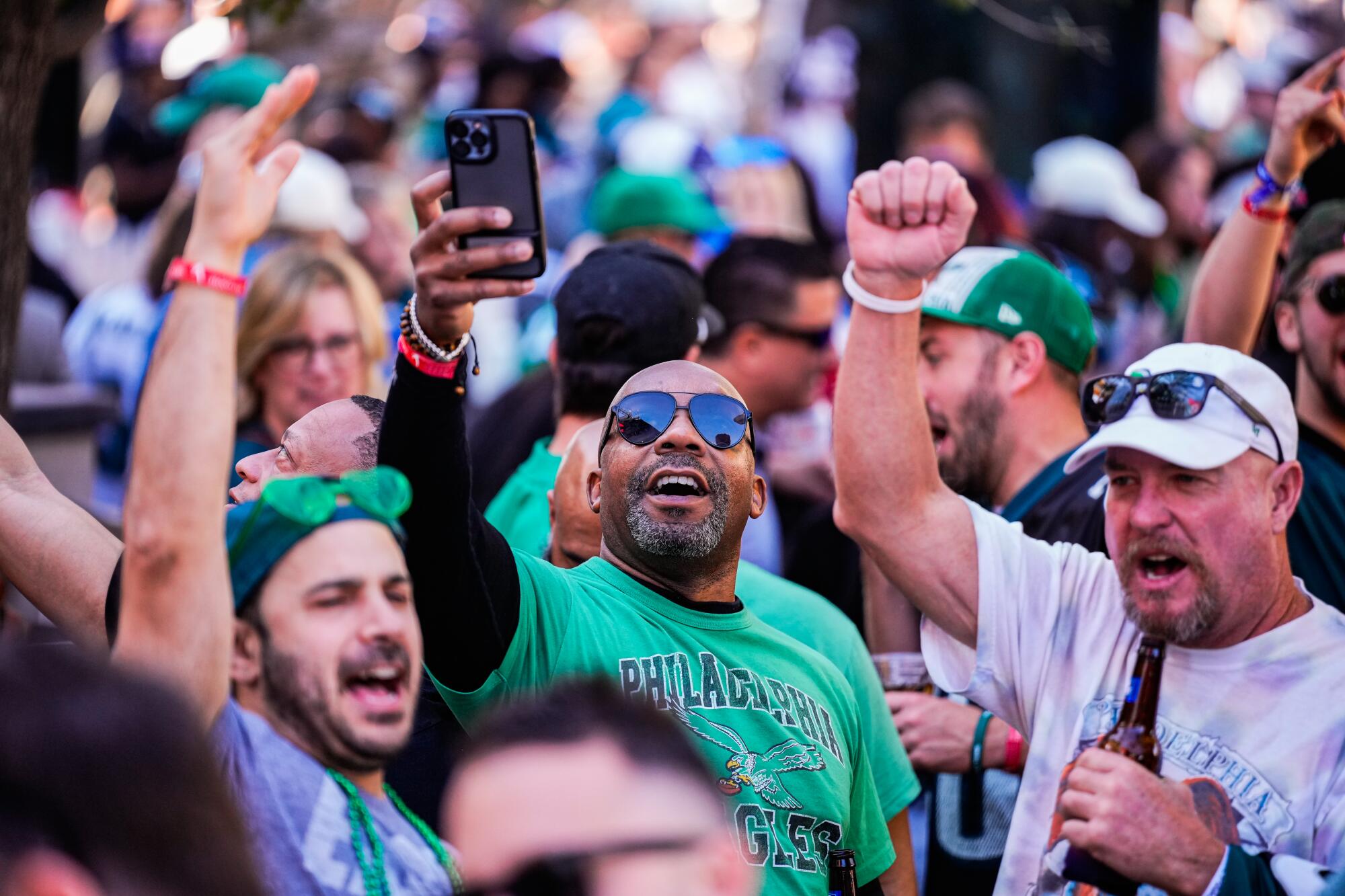
It made sense, then, that by 11 a.m. on Super Bowl Sunday, hundreds of Eagles fans took the streets. At McFadden’s, a bar on a corner in Glendale half a mile from the stadium, more than a thousand gathered, guided by a DJ leading them in chants of the Eagles fight song for hours.
From up there on the booth, it was like I could see the hope in each of them. Or, at least, the hallucination.
“2018 felt like the football gods smiled down upon us and said it was your turn,” Erock, the DJ and Philly personality, tells me. “This team didn’t ask permission. They believed in themselves and never lost focus. They never moved backwards. Every week was growth.”
Inside State Farm Arena that afternoon, there was a raucous war.
From the moment I got inside, it was packed to the brim. Walkways were blocked on the south side of the stadium as Eagles fans and Kansas City fans interwove. Philly fans dueled with folks from Kansas City near concessions lines and back corridors. Any time folks in those red jerseys howled that racist chop chant, it overtook a few crevices of the facility. But pesky “E-A-G-L-E-S, Eagles” chants fought it back three times as loud.
Every hour got more vociferous. Eagles fans were insistent. Chanting. One after another. At one point, walking around the arena, it felt like I was stuck on a repeating vinyl. The sounds were hypnotizingly incessant. Every 90 seconds I was being waterboarded by the thought of the Eagles flying on the road to victory. At the threat of a challenge, they rose again, determined not to be overtaken. Even if the call came from a corner of an arena, it panged around long enough to find someone who would keep it going. When one side roared, another matched them. One of the demented could echo the other, like bats bathing in the darkness.
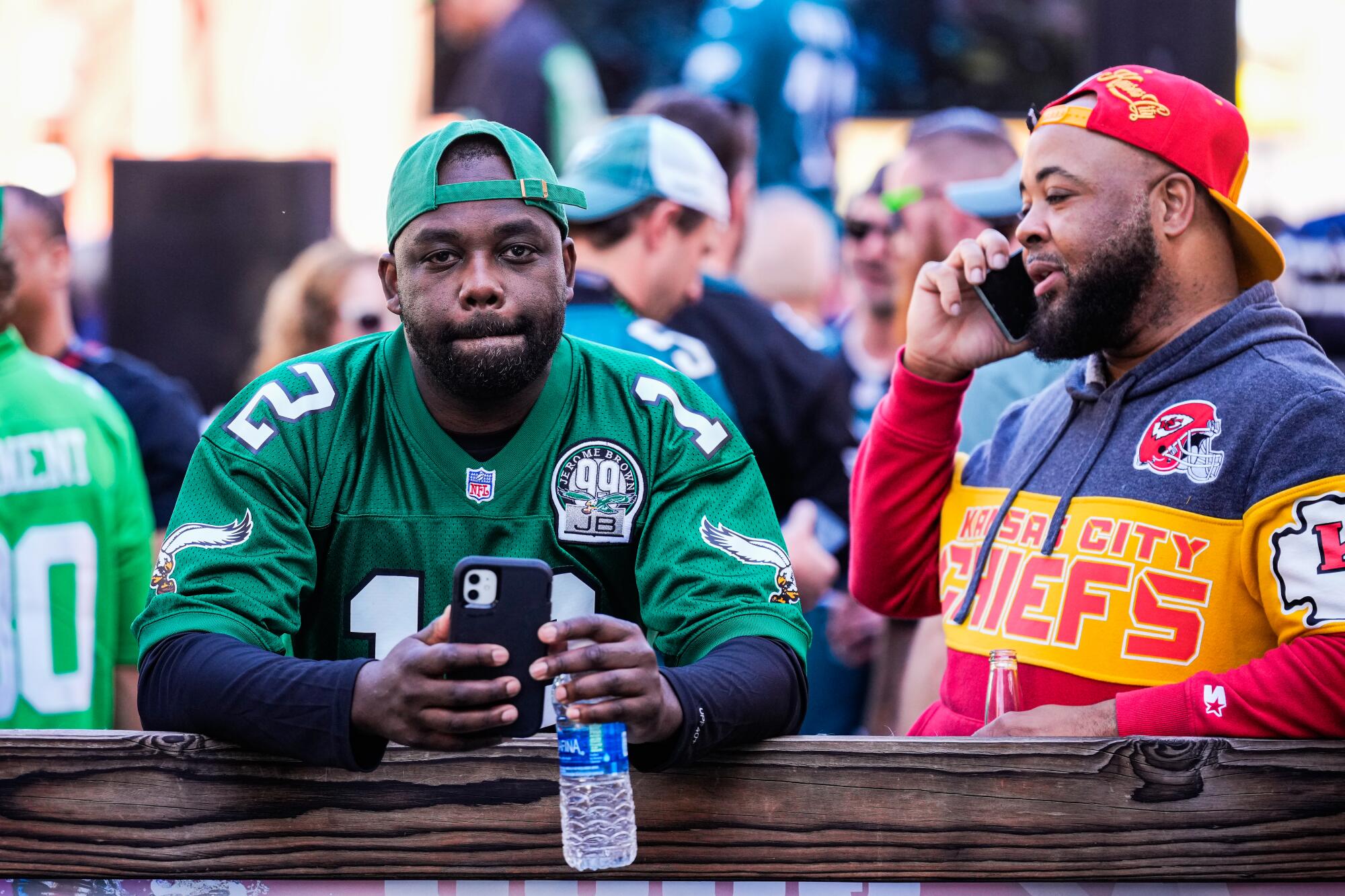
Old heads were caught on camera texting folks from out of town that they were outnumbered by Eagles fans in the arena. Some of them claimed they were already going deaf from all the “thumping rap music” and that it sounded like a concert in there. All night in the stands, Kansas City played the unfortunate pleasure of the flailing amateur next to a brilliant boxer’s jab. They were losing the undercard, being bullied in the stands like they played trombone in the high school band.
After halftime, the arena was shaking near Section 117 where Jamie, the Philly Sports Guy, was sitting. His brother flew him into town for free, and he hoofed it with a couple of friends through the week. Out of nowhere, he received a gift: tickets to the big game.
All around him, the stands were rattling in anticipation. Hurts and the boys were up by 10 at halftime. They rarely lost in that position.
The air became muffled and smoke still was lying atop the atmosphere of the dome. Every second in there, if you had a lifelong affliction colored red or green, it was hard to breathe. Pop after pop, score after score, the air was coming out of my stomach with each first down.
And when the buzzer turned zero, impossible came across the faces of every fan I’d met that week who had preached me the gospel. I’m sure my grandfather was laughing at me from above for being so foolhardy. We were all raised as losers, but when we looked up, somehow even we, the staunchest of believers in our own history, were shocked at the score on the board.
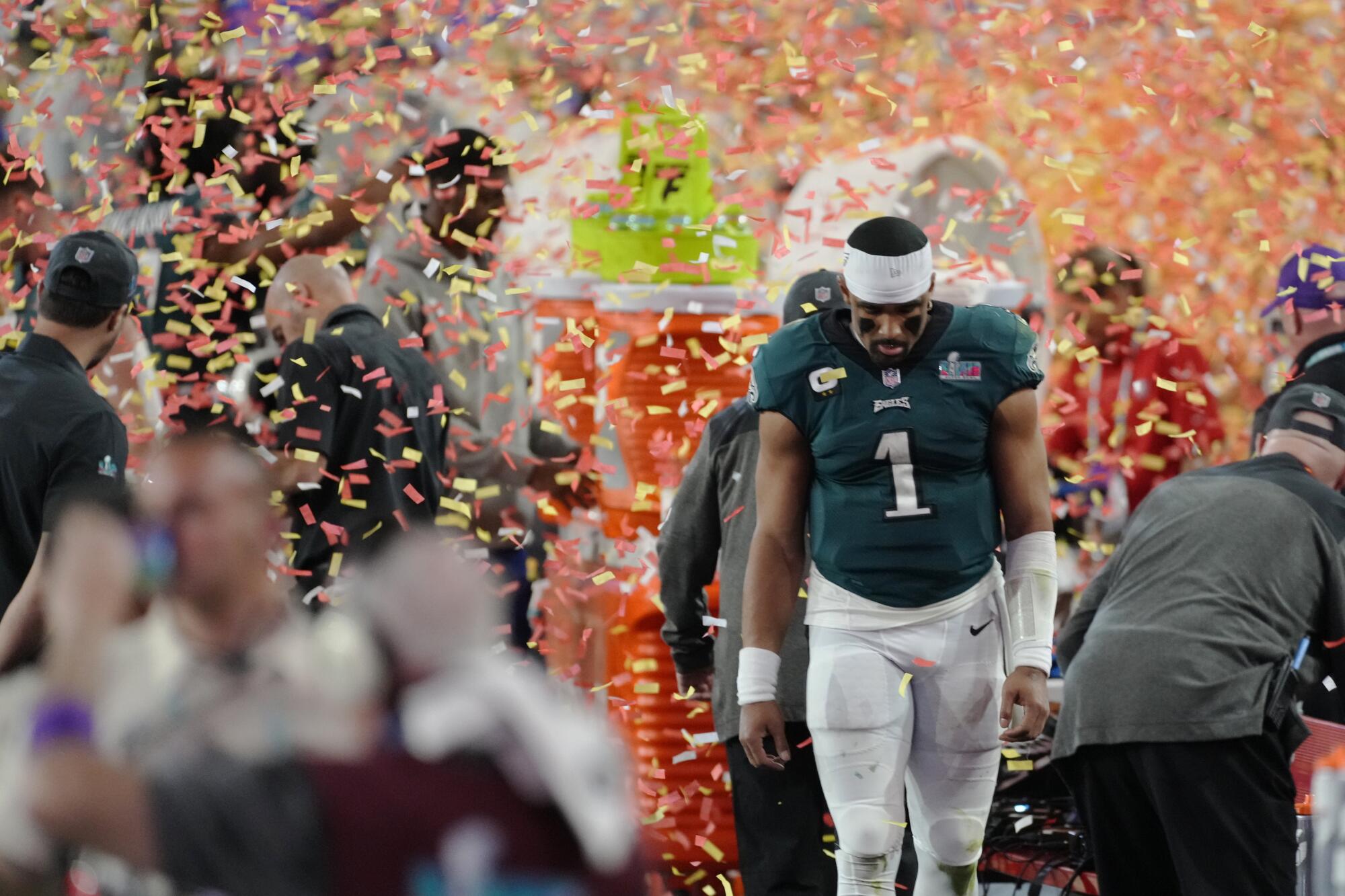
The game had been over for an hour, but there I was, still stuck to my seat overlooking the confetti on the grass for the other team. A security guard and I cracked a cold one while we gazed at the stage for one of the greatest games I’d ever seen Philadelphia be part of.
An Eagles fan who came to the game in green pajamas and matching face paint trudged up the stadium stairs toward the mezzanine. His face was beaten into a black eye of anguish and disgust. I thought he was going to have a breakdown.
I asked, You gonna be all right?
He barely looks my direction, lazily raising a solemn thumbs up to ensure he’s actually conscious. Ah, there’s nothing quite like the cocktail of gloom after a sports loss. It is the connective tissue between heartbreak and hunger. Rational and deranged. Some people decide if they want to learn from it. Others find reasoning between the crack of the storm clouds.
Granderson: The Super Bowl is being cast as progress for Black quarterbacks. Here’s why that’s wrong
The contest between quarterbacks Patrick Mahomes of the Chiefs and Jalen Hurts of the Eagles was delayed by NFL racism, not a lack of Black football talent.
Personally, I couldn’t keep hearing Kansas City fans bounce in their own elation any longer. I walked out the stadium and hopped on the first bus I could find.
It was eerie in downtown Phoenix when I got there. The only thing left was the unspeakable. Kansas City was almost too shy to celebrate, likely for fear of what the unfriendly City of Brotherly Love may have in store for them. There were no celebrations outside. Just men aimlessly wandering the streets of the desert in green close to midnight. That night, there was no consolation in defeat, just the stinging, unforgettable pain that came with it.
I opened my phone for the first time in hours, hoping the deluge of messages from family and friends didn’t bring me to tears on Fillmore Street. Miraculously, it was the opposite. Folks still were heading to Broad Street back home, those light poles be damned. Maybe they still had something to be proud of.
Philadelphians who flew west became nothing more than a crew of ruthless cowboys, chattering all week, only to be brazenly beaten down to the ground, shot in the breast and left to die. Hubris never tastes divine, but it always hits in the right spot. And there was nothing quite like a slow death in the desert.
Los Angeles Times columnist Jim Murray once wrote that “covering sports takes the fan out of you.” That felt like the easy way out in the hours after Philly’s demise. And while I’m sure that was true then, it can’t be now. Not, at least, how I was raised. Back home, whether you became a preacher or a president, if the Birds are on, you’d better be shouting.
Perhaps that’s why fandom is our accepted version of psychosis in the sporting congregation. It is the regularity of an agreed upon insanity which — depending on what type of man you are — exists until the end of your life. And, by God, if you’re lucky, infests your kids’ lives too.
Three generations ago, my grandfather taught me our sacred blood oath. And upon another, historic, loss for Philadelphia, I’m sure another generation of elders imbued a holy hate into their babies’ bodies to give them the resolve to grow into bastards who toss batteries all the same.
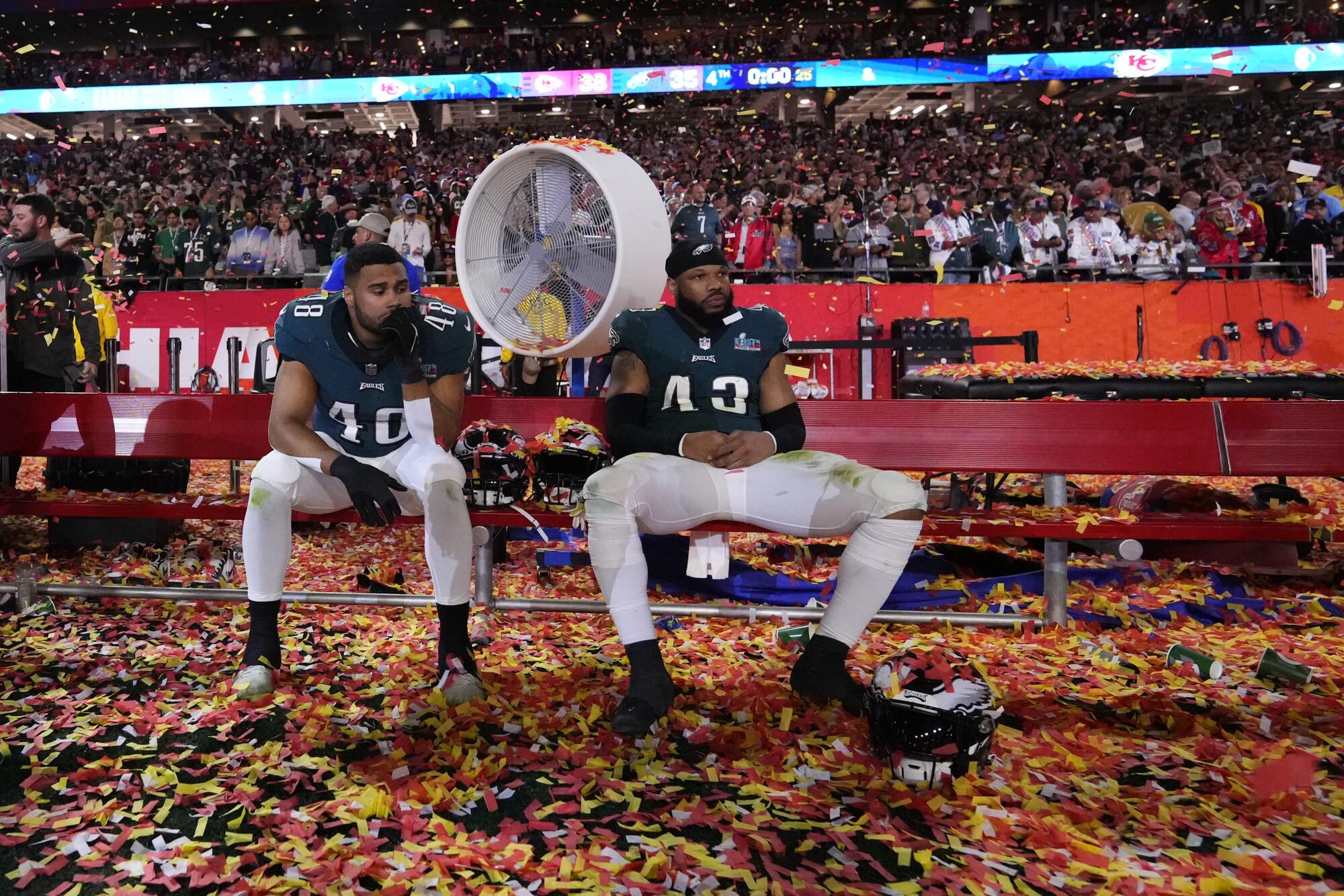
It may seem silly to onlookers, but a piece of our souls stayed in the sand that week. That loss was a flicker of hope for the franchise, but also a flashpoint in the middle of a night where all of our delusion died in that desert. David must’ve had the day off, because Goliath slayed the little bird in front of him.
Even as I woke up the next morning, I still couldn’t shake the rage. It was the inevitable, but I remained groggy after defeat. I still could hear those racist cheers from Kansas City’s fans ringing in my head.
I trudged downstairs and bathed in the Arizona sunlight, hoping it would shock me out of my slumber. I stepped outside to smoke, only to be joined by a hustlin’ man from Pensacola, Fla., who lit up next to me, in the parking lot of our hotel.
After some chit chat, he looked down at my hoodie — a vintage ode to the Eagles — and thought he’d break the ice.
Patrick Mahomes led the Chiefs to a Super Bowl win on a bum ankle, showing he is on a fast path to one day supplanting Tom Brady as football’s GOAT.
“How you feeling after last night, mane?” he asked.
Well now, and here I thought we were going to be friends.
Good brotha Pensacola sees the anger on my face and decides to change the topic.
“Life can be hard,” he said, gettin’ all philosophical.
In a way only both of us could know, in a spot for only us to listen, he said what I needed to hear.
“But,” he continued, “you know, anything in life worth struggle is worth fighting for.”
Pshhh.
Please.
This was football we were talking about.
He shrugged his shoulders, finished his cigarette and headed back inside.
Like magic, a few birds flew from a nearby tree and headed over the desert. I took a few more drags and flicked the zigzag into the dirt.
Sigh.
When does football season start again?
More to Read
Go beyond the scoreboard
Get the latest on L.A.'s teams in the daily Sports Report newsletter.
You may occasionally receive promotional content from the Los Angeles Times.
